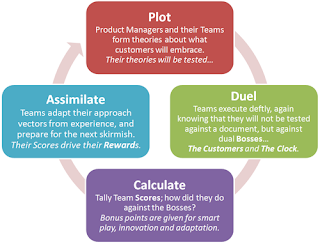WARNING: This is not just a game. Competitors could get hurt.
What do we really want from our Teams? How about true Value – the kind that customers will pay for – delivered rapidly, cheerfully and with high quality? Actively managing Teams in order to coerce them into delivery is inviable and wasteful; wouldn’t we rather have them reach for those goals themselves? Human nature can work in our favor, given the right equation to solve.
The Agile Game consists of a simple framework that integrates easily into any iterative and incremental methodology. It focuses Teams on quality delivery and true Customer acceptance (with external users, not just internal stakeholders), allocating Rewards based on market success. It addresses the wicked problems facing organizations today by presenting them to the Team as challenges, to be overcome through targeted competition and cooperation. Subtle game elements add flavor; for instance, optional Clues provide assistance to the Team while enticing them to innovate.
The basic idea can be likened to the classic PDCA (Plan, Do, Check, Act) cycle, but with a competitive twist:
Insights from training a NYC AAA game developer provided the integrative spark that brought this idea together. Their challenges represented nearly all of the key hurdles faced by Agile initiatives as they try to scale The Enterprise:
-
- Coalescing teams against a clear vision in complex projects
-
- Generating and proving ideas in innovative, exploratory projects
-
- Aligning Team rewards with product (not just project) success
-
- Driving and maintaining intelligent, adaptive behavior
-
- Measuring and visualizing true Value
-
- Aligning Organizations, Teams & Product Managers with their Customers
-
- Raising the apathetic and making work a bit of a thrill again.
Elegantly, it all happens simply by measuring the end, not the means, and letting Teams figure out the best tactics on their own. Metrics based on actual Customer perception mean that great Scores – and their concomitant Rewards – are found only with truly fine projects that deliver winners.
Does this sound interesting to you? We’re currently signing up volunteer organizations to test this out, while running small-scale experiments in semi-controlled environments, so we’d love to hear from you!

